
THE VOICE OF INTERNATIONAL LITHUANIA
|
VilNews has its own Google archive! Type a word in the above search box to find any article.
You can also follow us on Facebook. We have two different pages. Click to open and join.
|
News
![]()
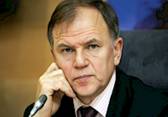
Lithuanian opposition leader
Vytenis Povilas Andriukaitis
Interview by Linas Jegelevicius
Sixty-year-old Vytenis Povilas Andriukaitis is one of the most seasoned politicians in the Lithuanian Parliament (Seimas), and one of the Lithuanian Social Democrat Party’s cornerstones. Born in Sacha, in the Far East of Russia, into a family of Lithuanian exiles, it was only in 1958, during the political thaw under the rule of the USSR leader Nikita Khrushchev, that his mother ventured to return to Lithuania, while his father was allowed to come back a year later. At secondary school Andriukaitis appeared to be a talented and keen pupil and athlete. He then entered Kaunas Medicine Institute in 1969, a big achievement for a child of exiles. In the Institute and thereafter, he got involved in anti-Soviet system activities. Detained by the KGB as a doctor, he was “exiled” again – this time 200 kilometers east, to a remote district of Ignalina. With Sajudis, the national movement for change building up, he joined the renewed party of Social Democrats and was elected its chairman during 1999-2001. Andriukaitis is a signatory of Lithuania’s Independence Act, a multi-term Seimas member and a candidate in the 1997 and 2002 presidential elections, and a vocal member of the Seimas’ Social Democrat fraction. Andriukaitis agreed to answer The Baltic Times questions.
- Bookmark :
- Digg
- del.icio.us
- Stumbleupon
- Redit it
Moscow, we have a problem in Lithuania
- Posted by - (0) Comment
![]()

Zoya Radzivilova
By Donata Motuzaite
IT’S NOT YOUR BUSINESS: Zoya Radzivilova showed her displeasure when asked about financing for her non-profit.
Why are non-profits financed by the Russkiy Mir foundation refusing to disclose their donors?
“Absolutely not,” Zoya Radzivilova replied when Re:Baltica called to ask for the names of foundations that finance her non-profit. Radzivilova is the director of the Vilnius-based youth theater group called Green Lantern. She also ran in two recent elections as a candidate for the Lithuanian Russian Union party. Radzivilova spoke fluent Lithuanian and didn’t hide her irritation with the question. The assistance she received abroad was no longer “Lithuania’s business,” she snapped back.
- Bookmark :
- Digg
- del.icio.us
- Stumbleupon
- Redit it
Lithuanian Interior Minister resigns – but does that save the ruling three-party coalition?
- Posted by - (0) Comment
![]()
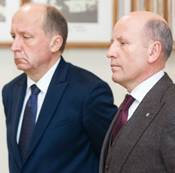
Lithuania's Interior Minister Raimundas Palaitis resigns after his heavily criticized sacking of two top officers at the Financial Crimes Investigation Service. But is that enough to save the increasingly divergent coalition government of Prime Minister Andrius Kubilius?
Lithuanian Minister of Interior Affairs Raimundas Palaitis announced on Monday that he will resign.
"I would like to say that I have no regrets whatsoever over my decision. I feel I was acting legitimately and rightly dismissing the two officers of the Financial Crime Investigation Service. But in the wake of such a difficult situation caused by actions that are hard to describe, I don't think that I should be an obstacle for Lithuania to advance, and I will shortly submit my resignation," the minister told journalists following a meeting with President Dalia Grybauskaitė and Prime Minister Andrius Kubilius.
Meanwhile the prime minister welcomed Palaitis' decision and added that it should have been made earlier.
"I welcome the minister's decision. Such a decision allows the coalition to continue common work. It would have been better if the decision had been made earlier," the head of the Lithuanian government said.
A week ago, Lithuanian President Dalia Grybauskaitė, who then refused to dismiss Palaitis, said the minister had acted according to the law.
"Taking into account the existing situation and tension between two coalition partners, when it comes specifically to Palaitis' actions, I would like to say that I did not dismiss Palaitis because, I believe, – and here we have a slight difference of opinion with the premier – he complied with all laws by dismissing the FCIS officers," the president said on Monday.
"Therefore, any compromise could have been reached only if the minister, aware of the tension in the coalition, had decided to leave this post. The minister will confirm this decision to you himself today," the president said before Palaitis announced his resignation.
- Bookmark :
- Digg
- del.icio.us
- Stumbleupon
- Redit it
Bulgarian Bella Hristova, violinist, and Lithuanian pianist Ieva Jokubaviciute again on stage together – now in Washington
- Posted by - (0) Comment
![]()

EMBASSY OF BULGARIA
1621 22ND STREET, NW
FRIDAY, MARCH 23, 2012 AT 7:30 PM- A FEW TICKETS REMAIN
BELLA HRISTOVA, VIOLIN
IEVA JOKUBAVICIUTE, PIANO
First Prize Winner in the 2008-09 Young Concert Artists International Auditions. Ms. Hristova and made her debut in the Young Concert Artists Series during the 2009-10 season at Merkin Concert Hall in New York, sponsored by the Rhoda Walker Teagle Prize, and at the Kennedy Center in Washington DC. At the Auditions, she was also awarded the Helen Armstrong Violin Fellowship, the Miriam Brody Aronson Award, the Ruth Laredo Memorial Award, the Candlelight Concert Society Concert Prize, and the Lied Center of Kansas Concert Prize. Program: Schumann, Tower, Janáček, Brahms. Very limited seating. $100/ including Bulgarian buffet dinner/wine.
- Bookmark :
- Digg
- del.icio.us
- Stumbleupon
- Redit it
![]()

Vilnius University has implemented a new virtualization lab that lets students understand cloud resources by provisioning their own. Vilnius University chose Abiquo from a company of the same name, to outfit the new lab, which is part of the school's Digital Science and Computing Center, built by the department of Mathematics and Informatics. Vilnius U, founded in the 16th century, has about 23,000 students.
The lab set-up is intended to allow students to provision virtual resources across multiple technologies without pulling in university IT staff to help.
- Bookmark :
- Digg
- del.icio.us
- Stumbleupon
- Redit it
The United States calls for Russia to probe reported fraud in the presidential election
- Posted by - (0) Comment
![]()
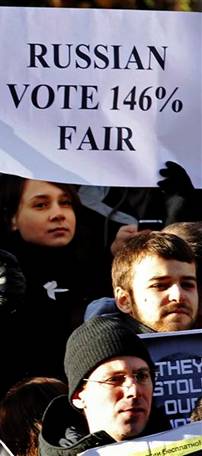
The United States last week called for Russia to probe reported election fraud as the West warily marked Vladimir Putin's return to the Kremlin amid congratulations from Asia and the Balkans.
Washington hoped Moscow would carry out an "independent, credible" investigation, said US State Department spokeswoman Victoria Nuland, after foreign monitors found the results had been skewed in Putin's favor.
Putin secured almost 64 percent of the vote in the election, winning back the Russian presidency he held for two terms from 2000-2008 before he took a four-year stint as prime minister.
But international observers led by the Organization for Security and Cooperation in Europe OSCE) said while there had been progress in transparency, the campaign had been massively tilted in favor of Putin.
"Conditions (for the campaign) were clearly skewed in favor of... Vladimir Putin" while the vote count was "assessed negatively in almost one-third of polling stations observed due to procedural irregularities," they said.
Hundreds protested Putin's comeback on the streets of Moscow after the election, some shouting out "disgrace," with police moving in to disperse the demonstrations and arresting dozens.
Nuland said Washington endorses the preliminary report by the OSCE and the Parliamentary Assembly of the Council of Europe (PACE).
And she added, without mentioning Putin by name, that the United States "looks forward to working with the president-elect after the results are certified and he is sworn in."
- Bookmark :
- Digg
- del.icio.us
- Stumbleupon
- Redit it
- Posted by - (0) Comment
President Grybauskaite:
EU’s economic sanctions will only further push Belarus into Russia's sphere of influence
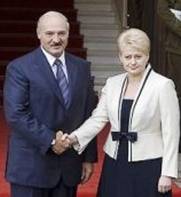
The European Union's economic sanctions against Belarus would only further push the latter into Russia's sphere of influence, Lithuanian President Dalia Grybauskaite said in an interview with Agence France-Presse (AFP).
EU economic sanctions would reduce Belarus' dependence on the West, Ms. Grybauskaite warned. She added that such sanctions could also affect ordinary people, Lithuanian news site Delfi said.
Ms. Grybauskaite repeatedly expressed opposition to international sanctions against Belarus in the past, explaining that they would prompt Minsk to seek closer ties with Russia.
While addressing EU ambassadors to Lithuania in November 2010, Ms. Grybauskaite reportedly called Alyaksandr Lukashenka the "guarantor" of Belarus' stability and independence, described Belarus' opposition as weak and said that Mr. Lukashenka enjoyed full support from the overwhelming majority of the country's population. //BelaPAN
- Bookmark :
- Digg
- del.icio.us
- Stumbleupon
- Redit it
Baltic Prime Ministers pledge nuclear support
- Posted by - (0) Comment
![]()
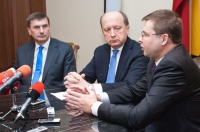
Baltic PMs converse
(Image: BFL/Tomo Lukšio)
The prime ministers of Estonia, Latvia and Lithuania have reaffirmed their commitment to build a new nuclear power plant serving the Baltic states and have promised to work together to make sure progress is maintained.
Prime ministers Andrus Ansip (Estonia), Valdis Dombrovskis (Latvia) and Andrius Kubilius (Lithuania) confirmed their support for the construction of the Visaginas plant at a two-day meeting in Prienai, Lithuania.
The meeting was also attended by representatives from Hitachi-GE, the strategic investor in the project, and from the European Commission.
The prime ministerial trio formally welcomed progress since their last gathering in November 2011, and went on to reaffirm their support for Visaginas "for the security of power supply in our countries" and for the three energy companies involved in the project – Eesti Energia, Latvenergo and Visagino Atominė Elektrinė (VAE).
The ministers said they would be encouraging the companies to finalise negotiations in a "timely manner" to ensure that the next milestone for the project - approval of a nuclear plant concession agreement by the Lithuanian parliament - is met by June 2012.
Two Soviet-era RBMK nuclear reactors at Ignalina in Lithuania were forced to close as a condition of Lithuania's accession to the European Union, leaving the region heavily dependent on electricity imports. The planned new Visaginas plant would give the countries the chance to diversify their energy portfolio and ensure greater energy security: at present Lithuania imports almost 90% of its gas from Russia.
- Bookmark :
- Digg
- del.icio.us
- Stumbleupon
- Redit it
![]()

Sveinung Stohle,
President and Chief Executive
of Hoegh LNG
* Norway's Hoegh LNG signs deal to supply FSRU to Lithuania
* LNG supply tender expected in Q2 2012
* LNG imports to end Gazprom's monopoly, put pressure on prices
Norwegian LNG service company Hoegh LNG on Friday signed a deal to supply a floating LNG import platform to Lithuania, in a move that will cut the Baltic country's dependence on gas imports from Russia.
The deal includes the 10-year lease and operation of a 170,000 cubic meters floating storage and regasification vessel (FSRU) with Lithuania's majority state-owned terminal Klaipedos Nafta at a cost of $156,200 per day.
"This is a market price... It's a fair deal for us and for Klaipedos Nafta," Sveinung Stohle, President and Chief Executive of Hoegh LNG, who signed the deal, told journalists in Vilnius.
LNG deliveries will end Gazprom's supply monopoly in the Baltic state

Energy Minister
Arvydas Sekmokas
The country's Energy Minister Arvydas Sekmokas hailed the deal as "prehaps the greatest achievement" in the energy sector since the Baltic state built the floating Butinge oil terminal in 1999.
When Russia cut oil supplies via pipeline in 2006, the country's refiner, now a part of Poland's PKN Orlen, was able to switch to sea crude deliveries.
"Russia Gazprom's excessively high gas prices forced us to develop this LNG terminal, which would help to assure security of supply... and to create a gas market," Sekmokas told journalists.
"That should help to cut gas prices... Today we have no leverage on Gazprom's prices," he added.
- Bookmark :
- Digg
- del.icio.us
- Stumbleupon
- Redit it
- Posted by - (0) Comment
11 March 1990 aftermath:
Gorbachev Warns Lithuania: Back Down or Face Blockade : Secession: His ultimatum gives the republic two days to rescind its independence moves or face a cutoff of oil and other vital goods

Mikhail Gorbachev,
Time Magazine (4 June 1990)
April 14, 1990|JOHN-THOR DAHLBURG | TIMES STAFF WRITER
MOSCOW — Soviet President Mikhail S. Gorbachev on Friday threatened the toughest action yet to quash Lithuania's month-old independence bid: an economic blockade of oil and other vital products if the breakaway Baltic republic does not reverse its challenge to Moscow's rule within two days.
Affairs are now at a "political dead end," Gorbachev and Prime Minister Nikolai I. Ryzhkov said in a toughly worded letter to the Lithuanian leadership. The letter, distributed by the official news agency Tass, betrayed the Kremlin's worry over the effects of Lithuania's continuing defiance of Moscow, including the danger of pro-independence contagion spreading to other regions.
- Bookmark :
- Digg
- del.icio.us
- Stumbleupon
- Redit it
- Posted by - (0) Comment
Lithuanian fined for Facebook comment:
“What we need is another Hitler to exterminate those fags ‘cause there’s just too many of them multiplying.”

Vladimir Simonko of the Lithuanian Gay League (LGL): “The complaint filed was a result of our regular monitoring of the media for hate speech.
A Lithuanian man, 37, has been fined nearly $600 after commenting on Facebook for “another Hitler” to kill gays. PinkNews.co.ukreported that the Lithuanian Gay League (LGL) alerted authorities to his post.
He had commented under an article on Facebook about Lady Gaga’s criticism of the Lithuanian government. He wrote, “What we need is another Hitler to exterminate those fags ‘cause there’s just too many of them multiplying.”
- Bookmark :
- Digg
- del.icio.us
- Stumbleupon
- Redit it
![]()

Emerging markets have taken noteworthy steps in advancing opportunities for women in the past year, according to the Economist Intelligence Unit (EIU). This is one of the conclusions of the Women’s Economic Opportunity (WEO) Index 2012, which measures specific attributes of the environment for women employees and entrepreneurs in 128 countries.
The findings include:
• Little change over the past year at the top and bottom of the Index. Sweden and Norway, with strong, gender-sensitive legislation and progressive cultural norms, remain at the top, while Chad and Sudan, which have scarce legal, educational and financial resources for women, stayed at the bottom.
• Lithuania and the Slovak Republic tied for the most improved score – an increase of 7.2 points – with gains in multiple areas.
- Bookmark :
- Digg
- del.icio.us
- Stumbleupon
- Redit it
Putin won, but Russians are growing tired of a political system that entrenches the privileges of an oligarchy of businessmen, bureaucrats and security men
- Posted by - (0) Comment
![]()

Illustration: http://vozni.wordpress.com
The Russian presidential campaign has hardly been short on drama: blood-curdling speeches, outbreaks of protest, the reported thwarting of an assassination plot. In the end, however, the result will be the same as could have been predicted months – or even years – ago. Vladimir Putin will return to the office he left in 2008, with the current president, Dmitri Medvedev, going back to his old job as prime minister.
On the face of it, then, this election means business as usual: Putin and his sidekick back in charge for another six years, and possibly 12.
Yet in fact, it represents something of a watershed for Russia. In the wake of those rigged elections, dissent is growing. Mr Putin has cast himself as the scourge of corruption, the man who tamed the gangsters. Yet Russians are growing tired of a political system that entrenches the privileges of an oligarchy of businessmen, bureaucrats and security men, and of an economy that depends on the fluctuating price of oil and gas rather than the skills and ideas of its workforce.
Mr Putin is still a popular figure, thanks largely to the cult of personality that surrounds him. Yet many of those voting for him yesterday were making a negative choice, rather than a positive one: they support him out of fear of a return to the chaos of the post-Soviet era, and in the absence (thanks to the Kremlin’s own strenuous efforts) of any credible alternative. With opponents of the regime growing increasingly vocal, we suspect he will find his next term in office a great deal more testing than the last.
- Bookmark :
- Digg
- del.icio.us
- Stumbleupon
- Redit it
![]()

Norwegian Reitan Servicehandel (RSH) has acquired more than 1.000 kiosks from the Finnish media company Sanoma OY in Finland, Estonia and Lithuania. The purchase price is approx. 130 million Euros. As a result of the latest acquisition, Magnus Reitan will manage more than 2.500 stores with close to NOK 14 billion in revenue and 18.000 employees in seven countries.
- This acquisition makes us Europe's second largest convenience store operator, an achievement of which we are very proud. All of the chains have a leading position in their respective markets, and it is with great humility we are going to further develop these brands in Finland, Estonia and Lithuania, Reitan Servicehandel CEO Magnus Reitan says.
The revenue in Finland, Estonia and Lithuania is to a great extent based on traditional newsstand products such as tobacco, magazines and lottery, while Narvesen and Pressbyran to a larger degree have developed new and profitable product groups such as meals to go, drinks and electronic services.
Reitan Servicehandel (RSH) comprises Narvesen in Norway and Latvia, Pressbyran in Sweden, and 7-Eleven in Norway, Sweden and Denmark. RSH holds a leading position in all four countries. As of 31 December 2011 the number of shops was 1.489, and RSH had revenues of NOK 11.4 billion in 2011.
Reitan Servicehandel is a part of the Reitan Group (Reitangruppen). The Reitan Group consists of four areas of operation: REMA 1000, Reitan Servicehandel, Reitan Real Estate (Reitan Eiendom) and the Uno-X Group. In addition, Reitan Group owns the subsidiary Spaceworld and holds a share of 15,62 percent in Axfood. Reitan Group's vision is to become known as Scandinavia's most value driven company. In 2011, Reitan Group had revenue of NOK 63 billion (including franchise turnover) and employed 27.500 people in Scandinavia and Latvia, making it one of Norway's ten largest companies.
- Bookmark :
- Digg
- del.icio.us
- Stumbleupon
- Redit it
Lithuania rescues 200 fisherman on ice floe
- Posted by - (0) Comment
![]()

Emergency crews in Lithuania rescued around 200 fishermen stranded on an ice floe in the Curonian Lagoon at Lithuania’s West Coast.
Two border patrol boats and a military helicopter were used in the operation Friday, and rescue coordinator Antanas Brencius said no one was injured.
Brencius says a crack in the ice in the Curonian Lagoon was widened by the northern winds, to the extent that the fishermen could not cross it and return to shore.
The freshwater lagoon is a popular fishing and holiday resort on the Baltic Sea.
- Bookmark :
- Digg
- del.icio.us
- Stumbleupon
- Redit it
Two workers die at Mažeikių Nafta
- Posted by - (0) Comment
![]()

Two workers have died at the Mazeikiu Nafta oil refinery in Lithuania after a vacuum tank exploded.
Refinery spokesman Andrius Stasiulaitis says the blast had a limited scope and has not affected overall operations at the plant, which is owned by Poland's PKN Orlen and is the largest enterprise in Lithuania in terms of revenues and taxes paid.
Stasiulaitis said Friday that the explosion killed two workers ages 48 and 51, and that an investigation has been launched.
A major fire broke at the refinery in 2007, causing some €38 million in damages and a significant decline in output.
- Bookmark :
- Digg
- del.icio.us
- Stumbleupon
- Redit it
VilNews e-magazine is published in Vilnius, Lithuania. Editor-in-Chief: Mr. Aage Myhre. Inquires to the editors: editor@VilNews.com.
Code of Ethics: See Section 2 – about VilNews. VilNews is not responsible for content on external links/web pages.
HOW TO ADVERTISE IN VILNEWS.
All content is copyrighted © 2011. UAB ‘VilNews’.

 Click on the buttons to open and read each of VilNews' 18 sub-sections
Click on the buttons to open and read each of VilNews' 18 sub-sections 















.jpg)



